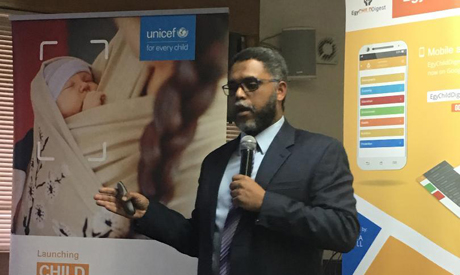The seminar held 16 October marking the launch of a series of data briefs on child related issues was short and to the point.
The first data snapshot presentation titled “Child malnutrition: Unfolding the situation in Egypt” came in conjunction with World Food Day, and came with a positive message: malnutrition it is one of the problems we have the power to stop before it even starts.
The former sentence which was on banners everywhere in UNICEF headquarters in Maadi district and on brochures gave a positive vibe, and was the lead of the words of Bruno Maes, UNICEF representative in Egypt.
“It is a vicious circle but yes," said Bruno Maes, UNICEF representative in Egypt to his audience at the UNICEF headquarters in Cairo's Maadi district, "but yes, it is preventable, as we can stop launching a new cycle of malnutrition before its starts.”
Maes covered the situation of malnutrition in Egypt, saying that although child mortality is decreasing, malnutrition has been on the rise for the last two decades.
“To solve the problem we have to acknowledge the vicious circle: a baby which is born malnourished grows into a child with increased liability to mortality, diseases, morbidity, decreased cognitive, motor and language skills, and ultimately increases healthcare expenditure, and into a young mother who gives birth to a malnourished newborn, and the cycle continues. We need to break the vicious circle early on,” he said.
Long-term consequences of malnutrition include an increase in the number of those afflicted by diabetes, hypertension and heart disease, as well as low school performance and decreased work capacity. "It is a huge burden on the economy,“ Maes said.
Maes highlighted the main efforts of UNICEF to combat malnutrition in Egypt, supporting partnerships with the government in addressing the causes and dealing with the consequences, and developing a national policy framework for nutrition.
Maes mentioned the model of “the first 1,000 days,” which covers improving the nutritional status of pregnant women and children below two years of age.
The efforts of UNICEF include improving infant and children feeding-related knowledge practices among parents and caregivers, as well as tackling the underlying causes of malnutrition by supporting the government’s social policy and efforts to steer services towards the poor and most venerable.
The actual situation of malnutrition in Egypt was outlined by Dr Moataz Saleh, child survival and development officer at UNICEF, who presented alarming facts based on data from the Egypt Demographic and Health Survey in 2014, revealing that nutrition is the second largest contributor to multidimensional poverty in Egypt for children under the age of five, after child exposure to violence.

Dr Moataz Saleh (photo: Ahramonline)
“Each child at a certain age should have a certain weight that goes in accordance with a certain height. When any of these two is disturbed, malnutrition occurs, so we are talking here about over-nutrition as well as nutrition,” Saleh said.
Saleh said the foremost problem is stunted growth, defined as a low height for age, affecting one in each five children in Egypt.
As for wasting, defined as low weight for height, it has increased significantly since 2000, especially among girls, standing at eight percent. Underweight stands at six per cent, and incidence of anemia at 27 percent.
“Unfortunately, we are one of 36 countries in the world with the highest rates of stunting,” Saleh said.
Saleh stressed that in Egypt certain nutrition problems stand out among women and girls. Of females 5-19 years of age, and married women 15-49 years, obesity or overweight stands at 36 percent and 85 percent respectively. Anemia is also a critical issue affecting one quarter of women within reproductive age.
Although apparent causes are inadequate dietary intake and disease, Saleh says that underlying contributors include household food insecurity, inadequate feeding practices, and poor sanitation and hygiene practices.
Saleh underlined the importance of the economic return of combating malnutrition, stating that UNICEF data points that "an investment of $1 in nutrition will yield $16 in returns."
Egypt is a signatory to the Sustainable Development Goals set by the UN, of which combating malnutrition is integral.
"Egypt aims to reduce stunting to 15 percent by 2020, which is quite challenging," Saleh said. “This is the decade of nutrition for UN agencies, and all stakeholders need to work together to move forward and yield results,” he concluded.
Short link: